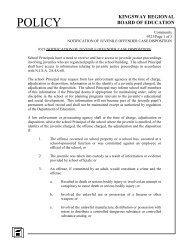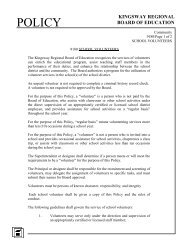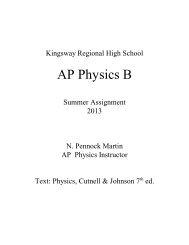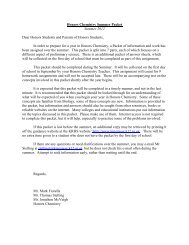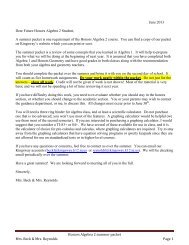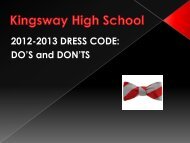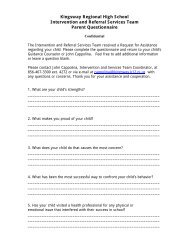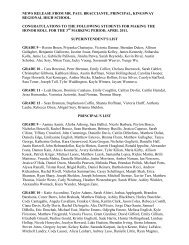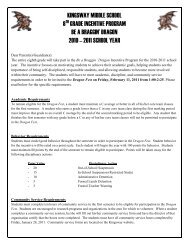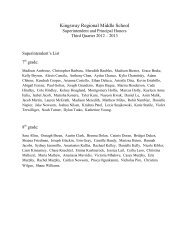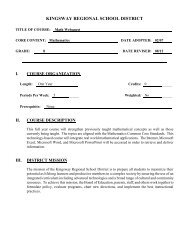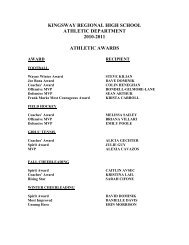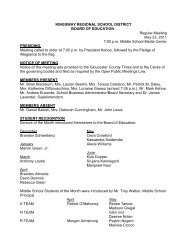Advanced Placement English IV- Literature and Composition
Advanced Placement English IV- Literature and Composition
Advanced Placement English IV- Literature and Composition
You also want an ePaper? Increase the reach of your titles
YUMPU automatically turns print PDFs into web optimized ePapers that Google loves.
Name _____________________<br />
AP ENGLISH <strong>IV</strong> – <strong>Literature</strong> <strong>and</strong> <strong>Composition</strong><br />
SUMMER READING AND WRITING ASSIGNMENTS<br />
Mrs. Carpenter donnaocarpenter@aol.com http://moodle.kingsway.k12.nj.us<br />
“Every book has a soul. The soul of the person who wrote it <strong>and</strong> of those who read <strong>and</strong> lived <strong>and</strong> dreamed with it.<br />
Every time a book changes h<strong>and</strong>s, every time someone runs his eyes down its pages, its spirit grows <strong>and</strong><br />
strengthens."<br />
-- from The Shadow of the Wind by Carlos Ruiz Zafon<br />
Welcome to AP <strong>English</strong> <strong>IV</strong>!<br />
Congratulations! You have made a wise <strong>and</strong> important decision in your high school career. By enrolling<br />
in Kingsway’s AP <strong>English</strong> <strong>Literature</strong> course, you have committed yourself to:<br />
ü learning to read literature more closely than ever before<br />
ü writing more clearly <strong>and</strong> learning to take risks in your writing<br />
ü thinking more deeply <strong>and</strong> more critically about the words on a page <strong>and</strong> the world<br />
around you <strong>and</strong> within you<br />
I look forward to getting to know you in September. Together, we will experience the immense power<br />
<strong>and</strong> meaning of great literary works. We will travel to new places, meet unforgettable characters <strong>and</strong><br />
writers, share <strong>and</strong> discuss a multitude of thoughts about human nature, <strong>and</strong> most importantly, grow<br />
intellectually <strong>and</strong> emotionally through this process.<br />
Our journey begins this summer with your assigned readings, accompanying writing assignments, <strong>and</strong><br />
participation in online discussion.<br />
Your reading assignments are:<br />
1. How to Read <strong>Literature</strong> Like a Professor by Thomas Foster<br />
2. Lord of the Flies, a novel by William Golding<br />
3. One contemporary novel from the list that follows<br />
Your writing assignments are:<br />
1. The attached assignment that will “guide” you through How to Read <strong>Literature</strong> <strong>and</strong> require you<br />
to reflect on the reading you have done (or films that you have viewed) prior to this course. All<br />
responses should be written in the composition book I provided you. (Poems should either be<br />
re-written there or printed out <strong>and</strong> glued/stapled onto the pages.)<br />
2. A two-page typed essay responding to the following prompt related to your contemporary<br />
novel. (Please save this essay on your computer or a flashdrive. There will be additional<br />
assignments associated with this essay!)<br />
1
How to approach these assignments:<br />
How to Read <strong>Literature</strong> (HTRLLAP) by Thomas Foster<br />
This is the most time-intensive part of your AP summer work. There are 27 chapters in this book about<br />
how to become a “close reader.” The attached assignment follows the book chapter by chapter. My<br />
suggestion? Do not leave this assignment off until the last week of August. You will be burning the<br />
midnight oil to finish before school starts. Instead, work through the reading <strong>and</strong> assignment by pacing<br />
yourself a few chapters each week. 27 chapters/10 weeks—you do the math. I will be collecting your<br />
completed assignment on the first day back in September. Use the composition book that I provided for<br />
these responses. Each response, depending on the size of your h<strong>and</strong>writing, should occupy a full page.<br />
Please do not h<strong>and</strong> in your first assignment late. (Take care of this composition book…it will get plenty<br />
of use throughout the year.)<br />
Lord of the Flies by William Golding<br />
Do not let Golding’s descriptive writing style discourage you. After the first few chapters, you will find<br />
yourself immersed in an engaging story about what would happen if young boys were str<strong>and</strong>ed on a<br />
remote isl<strong>and</strong> with no adult authority (yes, kind of like LOST). Please note that a few of your Foster<br />
journal prompts are related to this novel. After class discussion, you will be writing an in-class essay<br />
about Lord of the Flies. (I would suggest that you not begin reading this novel until August so that it is<br />
fresh in your mind during the first days of class. As you read, return to the Foster journal prompts to<br />
respond to those questions.)<br />
Online discussion<br />
By now, you are “enrolled” in our class on Moodle. There are two questions that require your online<br />
response over the summer. These are related to How to Read <strong>Literature</strong>. See the questions <strong>and</strong> response<br />
deadlines below. This is an informal forum <strong>and</strong> you are welcome to add your thoughts/ideas more than<br />
once. I will chime in on occasion to energize <strong>and</strong> extend your discussion points. At least one “post” is<br />
required from each student for each question.<br />
Short essay<br />
On the first day of class, you should h<strong>and</strong> in a typed (12 pt. times roman double-spaced) essay (two<br />
pages minimum/three pages maximum) that responds to the following writing prompt about the<br />
contemporary novel you chose to read:<br />
In reading fiction we share the imaginative vision of another, adopting, however briefly, his or<br />
her way of perceiving the world. Through reading a wide variety of stories we can enter many<br />
different imaginative worlds, in the process enlarging <strong>and</strong> deepening our own perception of the<br />
world.<br />
Read a contemporary novel from the provided list. In a well-organized essay, discuss how that<br />
fictional work “enlarged <strong>and</strong> deepened your own perception of the world.”<br />
Remember, I am your reader. I do not need to know the details of the plot, descriptions of characters or<br />
setting, or the literary elements used by the author. What I want to know is how the novel “changed”<br />
you in some way, large or small. Some advice: visit “Mrs. Carpenter’s rules of essay writing” as well as<br />
other writing resources on our class Moodle page.<br />
2
Contemporary Novel List<br />
Choose one for your essay but feel free to read as many as you wish. I highly recommend ALL<br />
of these novels. They are very different so I suggest you take a look at each one at a library,<br />
bookstore or at www.amazon.com before you make your choice.<br />
A Thous<strong>and</strong> Splendid Suns by Khaled Hosseini<br />
An in-depth exploration of Afghan society in the three decades of anti-Soviet jihad, civil war <strong>and</strong> Taliban cruelty,<br />
centered around the lives <strong>and</strong> experiences of two Afghani women.<br />
The Book Thief by Marcus Zusak<br />
Death himself narrates the World War II-era story of Liesel Meminger from the time she is taken, at age nine, to<br />
live in Molching, Germany, with a foster family in a working-class neighborhood of tough kids, acid-tongued<br />
mothers, <strong>and</strong> loving fathers who earn their living by the work of their h<strong>and</strong>s.<br />
Old School by Tobias Wolff<br />
A scholarship boy at a New Engl<strong>and</strong> prep school grapples with literary ambition <strong>and</strong> insecurity in this lucid,<br />
deceptively sedate novel, set in the early 1960s <strong>and</strong> narrated by the unnamed protagonist from the vantage point of<br />
adulthood.<br />
Poisonwood Bible by Barbara Kingsolver<br />
A suspenseful epic of one family's tragic undoing <strong>and</strong> remarkable reconstruction over the course of three decades<br />
in postcolonial Africa.<br />
The Round House by Louise Erdrich<br />
An exquisitely told story of a boy on the cusp of manhood who seeks justice <strong>and</strong> underst<strong>and</strong>ing in the wake of a<br />
terrible crime that upends <strong>and</strong> forever transforms his family.<br />
Song of Solomon by Toni Morrison<br />
Told through the eyes of "Milkman," a rare male protagonist in Morrison's wonderful catalog of unforgettable<br />
characters, the reader discovers a century's worth of secrets, ghosts, <strong>and</strong> troubles.<br />
We Were the Mulvaneys by Joyce Carol Oates<br />
A profound <strong>and</strong> darkly realistic chronicle of one family's hubristic heyday <strong>and</strong> its fall from grace.<br />
All of these novels are available at your local library or at any Barnes & Noble or on amazon.com.<br />
Feeling super motivated?<br />
You will be required to complete “Novel Notes” for your contemporary novel <strong>and</strong> for Lord of the Flies.<br />
You may find it best to do this while reading the novels or immediately after you finish them.<br />
Completing these assignments before school starts will save you time during the hectic first few weeks<br />
of the school year. The Novel Notes template can be found on our class Moodle site. Email me if you<br />
have any questions.<br />
And finally…how will this assignment impact your grade?<br />
This summer assignment is your first grade in AP <strong>English</strong> <strong>Literature</strong>. The grade will be composed of<br />
your Foster journal (50%), contemporary essay (40%) <strong>and</strong> Novel Notes (10%). In addition, you will<br />
write an in-class essay about Lord of the Flies. All told, the summer assignments are roughly onequarter<br />
of your first marking period grade. Make it an A! J<br />
Want to be a better writer? Read, read <strong>and</strong> then read some more.<br />
3
How to Read <strong>Literature</strong> Like a<br />
Professor: A Lively <strong>and</strong> Entertaining<br />
Guide to Reading Between the Lines<br />
by Thomas C. Foster<br />
In Arthur Conan Doyle's "The Red-Headed League,"<br />
Sherlock Holmes <strong>and</strong> Dr. John Watson both observe Jabez<br />
Wilson carefully, yet their differing interpretations of the same<br />
details reveal the difference between a "Good Reader" <strong>and</strong> a "Bad<br />
Reader." Watson can only describe what he sees; Holmes has the<br />
knowledge to interpret what he sees, to draw conclusions, <strong>and</strong> to solve<br />
the mystery.<br />
Underst<strong>and</strong>ing literature need not be a mystery -- Thomas Foster's book will help transform<br />
you from a naive, sometimes confused Watson to an insightful, literary Holmes. Professors <strong>and</strong><br />
other informed readers see symbols, archetypes, <strong>and</strong> patterns because those things are there --<br />
if you have learned to look for them. As Foster says, you learn to recognize the literary<br />
conventions the "same way you get to Carnegie Hall. Practice." (xiv).<br />
Note to students: These short writing assignments will help you practice your literary analysis<br />
<strong>and</strong> they will help me get to know you <strong>and</strong> your literary tastes. Whenever I ask for an example<br />
from literature, you may use short stories, novels, plays, or films (yes, film is a literary genre).<br />
If your literary repertoire is thin <strong>and</strong> undeveloped, use the book’s Appendix to jog your<br />
memory or to select additional works to explore. At the very least, watch some of the "Movies<br />
to Read" that are listed on pages 293-294. Please note that your responses should be<br />
paragraphs -- not pages! Each entry should start on a fresh page. All responses should be<br />
recorded in the marble composition book that I provided you. This composition book will be<br />
used repeatedly throughout the year. This is just the beginning…<br />
Even though this is analytical writing, you may use "I" if you deem it important to do so;<br />
remember, however, that most uses of "I" are just padding. For example, "I think the wolf is<br />
the most important character in 'Little Red Riding Hood'" is padded. As you compose each<br />
written response, re-phrase the prompt as part of your answer. In other words, I should be able<br />
to tell which question you are answering without referring back to the prompts.<br />
Concerning mechanics, pay special attention to pronouns. Make antecedents clear. Say Foster<br />
first; not "he." Remember to capitalize <strong>and</strong> punctuate titles properly for each genre.<br />
Do not be overwhelmed by this assignment! View it as an introduction to the course. If you<br />
pace yourself (a few chapters each week, for example), you will be fine. Be aware of the three<br />
online due dates: June 28, July 20 <strong>and</strong> August 17. If you will be away <strong>and</strong> without computer<br />
access, be sure to post your responses before you leave.<br />
4
YOUR ASSIGNMENT: CHAPTER BY CHAPTER<br />
***********************************************************************<br />
Introduction: How'd He Do That?<br />
Use The Great Gatsby or Grapes of Wrath to respond to the following:<br />
How do memory, symbol, <strong>and</strong> pattern affect the reading of literature? How does the recognition of<br />
patterns make it easier to read complicated literature? Discuss a time when your appreciation of a<br />
literary work was enhanced by underst<strong>and</strong>ing symbol or pattern.<br />
Chapter 1 -- Every Trip Is a Quest (Except When It's Not)<br />
Use The Odyssey or The Pearl to respond to the following:<br />
List the five aspects of the QUEST <strong>and</strong> then apply them to The Odyssey or The Pearl in the form used<br />
on pages 3-5.<br />
Chapter 2 -- Nice to Eat with You: Acts of Communion<br />
Choose a meal from Lord of the Flies <strong>and</strong> apply the ideas of Chapter 2 to this literary depiction. Note:<br />
Do not worry if you haven’t read Lord of the Flies yet. Just make a chapter heading on the next blank<br />
page in your journal, leave the page blank <strong>and</strong> come back to answer the question in August.<br />
Chapter 3: --Nice to Eat You: Acts of Vampires<br />
What are the essentials of the Vampire story? Apply this to Joyce Carol Oates’ short story, “Where are<br />
you going? Where have you been?” (a copy is provided with your summer assignment materials).<br />
Discuss the elements of the vampire story that you see present in Oates’ famous story.<br />
Chapter 4 -- If It's Square, It's a Sonnet<br />
Select three sonnets <strong>and</strong> show which form they are. Discuss how their content reflects the form.<br />
(Submit copies of the sonnets, marked to show your analysis). Where to find sonnets? Try these online<br />
resources or skim the poetry books at Barnes & Noble or at a library.<br />
Shakespearean sonnets at www.shakespeare-online.com/sonnets/Sonnet Central at www.sonnets.org<br />
where I would recommend John Donne (“Death be not proud” is one of my favorites <strong>and</strong> one we will<br />
study this year: www.sonnets.org/donne.htm#110) or William Wordsworth (“The world is too much<br />
with us” is another favorite: www.sonnets.org/wordsworth.htm#050). And take a look at some modern<br />
sonnets (www.poets.org).<br />
IMPORTANT~THIS NEXT ONE IS AN ONLINE POST. Your response to this chapter should<br />
be posted on our Moodle social forum no later than Friday, June 28 at 10 PM.<br />
Chapter 5 --Now, Where Have I Seen Her Before?<br />
In your journal, define intertextuality. On our Moodle Social Forum, discuss three examples that have<br />
helped you in reading specific works.<br />
Chapter 6 -- When in Doubt, It's from Shakespeare...<br />
Discuss a work that you are familiar with that alludes to or reflects Shakespeare. Show how the author<br />
uses this connection thematically. Read pages 44-46 carefully. In these pages, Foster shows how Fugard<br />
reflects Shakespeare through both plot <strong>and</strong> theme. In your discussion, focus on theme.<br />
Chapter 7 -- ...Or the Bible<br />
Many critics compare aspects of the setting in Lord of the Flies to the Garden of Eden. Read a print or<br />
online version of Genesis, Chapters 2 <strong>and</strong> 3 in the Bible (www.bibleontheweb.com is a good source).<br />
What comparisons can you draw between the two stories or between their settings? Note: Do not worry<br />
if you haven’t read Lord of the Flies yet. Just make a chapter heading on the next blank page in your<br />
journal, leave the page blank <strong>and</strong> come back to answer the question in August.<br />
5
Chapter 8 -- Hanseldee <strong>and</strong> Greteldum<br />
Think of a work of literature that reflects a fairy tale. Discuss the parallels. Does it create irony or<br />
deepen appreciation?<br />
Chapter 9 -- It's Greek to Me<br />
Write a free verse poem derived or inspired by characters or situations from Greek mythology. Be<br />
creative <strong>and</strong> have fun with this. Need some help or a memory refresher on Greek mythology? Try these<br />
sites: http://web.uvic.ca/grs/bowman/myth/index.html or www.pantheon.org or www.mythweb.com<br />
IMPORTANT~THIS NEXT ONE IS AN ONLINE POST. Your response to this chapter should<br />
be posted on our Moodle social forum no later than Friday, July 19 at 10 PM<br />
Chapter 10 -- It's More Than Just Rain or Snow<br />
Discuss the importance of weather in a specific literary work, not in terms of plot. You may use a film<br />
in this response.<br />
Interlude -- Does He Mean That<br />
Chapter 11 --...More Than It's Gonna Hurt You: Concerning Violence<br />
Present examples of the two kinds of violence found in literature. Show how the effects are different.<br />
Chapter 12 -- Is That a Symbol?<br />
Use the process described on page 106 <strong>and</strong> investigate the symbolism of the isl<strong>and</strong>, fire or Piggy’s<br />
glasses in Lord of the Flies.<br />
Chapter 13 -- It's All Political<br />
Assume that Foster is right <strong>and</strong> "it is all political." Use his criteria to show that one of the major works<br />
assigned to you since you’ve been at Kingsway is political.<br />
Chapter 14 -- Yes, She's a Christ Figure, Too<br />
Apply the criteria on page 119 to a major character in a significant literary work. Try to choose a<br />
character that will have many matches. This is a particularly apt tool for analyzing film -- for example,<br />
Star Wars, Cool H<strong>and</strong> Luke, Excalibur, Malcolm X, Braveheart, Spartacus, Gladiator <strong>and</strong> Ben-Hur.<br />
Chapter 15 -- Flights of Fancy<br />
Select a literary work in which flight signifies escape or freedom. Explain in detail.<br />
Chapter 16 -- It's All About Sex...<br />
Chapter 17 -- ...Except the Sex<br />
OK ..the sex chapters. The key idea from this chapter is that "scenes in which sex is coded rather than<br />
explicit can work at multiple levels <strong>and</strong> sometimes be more intense that literal depictions" (141). In<br />
other words, sex is often suggested with much more art <strong>and</strong> effort than it is described, <strong>and</strong>, if the author<br />
is doing his job, it reflects <strong>and</strong> creates theme or character. Choose a novel or movie in which sex is<br />
suggested, but not described, <strong>and</strong> discuss how the relationship is suggested <strong>and</strong> how this implication<br />
affects the theme or develops characterization.<br />
Chapter 18 -- If She Comes Up, It's Baptism<br />
Think of a "baptism scene" from a significant literary work. How was the character different after the<br />
experience? Discuss.<br />
Chapter 19 -- Geography Matters...<br />
And now for something completely different, illustrate this chapter. Include at least four aspects that<br />
Foster would include as "geography." Be creative <strong>and</strong> colorful. Use a full journal page.<br />
Chapter 20 -- ...So Does Season<br />
Find a poem that mentions a specific season. Then discuss how the poet uses the season in a<br />
meaningful, traditional, or unusual way. (Submit a copy of the poem with your analysis…see suggested<br />
websites for chapter 4—or visit a library or bookstore.)<br />
6
Interlude -- One Story<br />
Write your own definition for archetype. Then identify an archetypal story <strong>and</strong> apply it to a literary<br />
work with which you are familiar.<br />
Chapter 21 -- Marked for Greatness<br />
Figure out Harry Potter's scar. If you aren't familiar with Harry Potter, select another character with a<br />
physical imperfection <strong>and</strong> analyze its implications for characterization.<br />
Chapter 22 -- He's Blind for a Reason, You Know<br />
Chapter 23 -- It's Never Just Heart Disease...<br />
Chapter 24 -- ...And Rarely Just Illness<br />
Recall two characters who died of a disease in a literary work. Consider how these deaths reflect the<br />
"principles governing the use of disease in literature" (215-217). Discuss the effectiveness of the death<br />
as related to plot, theme, or symbolism.<br />
IMPORTANT~THIS NEXT ONE IS AN ONLINE POST. Your response to this chapter should<br />
be posted on the social forum section of our class Moodle site no later than Friday, August 16 at<br />
10 PM.<br />
Chapter 25 -- Don't Read with Your Eyes<br />
After reading Chapter 25, choose a scene or episode from a novel, play or epic written before the 20th<br />
century. Contrast how it could be viewed by a reader from the 21st century with how it might be viewed<br />
by a contemporary reader. Focus on specific assumptions that the author makes, assumptions that would<br />
not make it in this century.<br />
Chapter 26 -- Is He Serious? And Other Ironies<br />
Read the essay provided with your summer assignments. This is a famous work that we will discuss<br />
early in the year. Feel free to make notes in the margins as you read, underline, highlight, etc. Then<br />
establish the central ironies of the essay <strong>and</strong> explain the multivocal nature of the irony in the work.<br />
Chapter 27 -- A Test Case<br />
Read "The Garden Party" by Katherine Mansfield, the short story starting on page 245. Complete the<br />
exercise on pages 265-266, following the directions exactly. Then compare your writing with the three<br />
examples. How did you do? What does the essay that follows comparing Laura with Persephone add to<br />
your appreciation of Mansfield's story?<br />
Envoi<br />
Choose a motif not discussed in this book (such as the horse reference on page 280) <strong>and</strong> note its<br />
appearance in three or four different works. What does this idea seem to signify?<br />
I expect your responses to be your own thinking, not the result of online searches (my former<br />
students will tell you that I have a knack for knowing when the work they complete is not their<br />
own…neither you nor I want to suffer the consequences of that discovery). However, you may<br />
brainstorm with family members or friends or even email me for help. But the ideas themselves<br />
must be your own. Do not let this assignment become a burden. Enjoy your many recollections<br />
of the novels <strong>and</strong> plays you have read <strong>and</strong> the films you have enjoyed.<br />
If you have questions, please email me during the summer at donnaocarpenter@aol.com.<br />
Do not hesitate to do so!<br />
I am available by email most of the summer.<br />
This assignment will be collected on our first day of class.<br />
Adapted from assignments originally developed by Donna Anglin <strong>and</strong> S<strong>and</strong>ra Effinger.<br />
7




